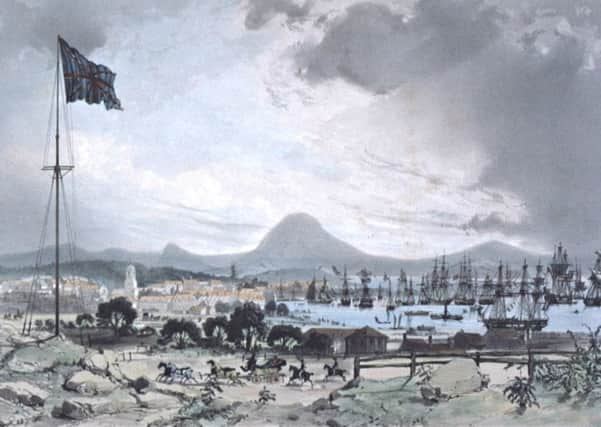The Aberdeen women transported 10,000 miles for petty theft


The five, aged between their mid 20s and early 60s, were transported on the same ship more than 10,000 miles to Van Diemen’s Land to serve their sentences of seven years.
All were convicted in the High Court in Aberdeen in April 1835 and three of them came from the same street.
Advertisement
Hide AdAdvertisement
Hide AdAs far as is known, Isabella Watt, Elspet Leslie, Ann Balfour, Margaret Millar and Isabell Cruickshank never saw Scotland again.
They were among dozens of Scots women transported for present-day Tasmania on the same ship. Three of them were from the same city centre street.
Anne Balfour, 25, travelled with her nine-month-old baby, leaving her four other children at home in Aberdeen.
Listed in court records as a single woman originally from Fife, she had worked as a country servant and had skills in milking, making butter and cooking.
Advertisement
Hide AdAdvertisement
Hide AdShe was transported after stealing money given to her by a man to buy whisky and had earlier served time for disorderly conduct.
Isabella Watt, 25, who also had previous convictions, was transported with her eight-year-old child after being convicted of theft and robbery.
Her brothers, James and John, were already in Hobart, then the largest settlement on the island, when she arrived. Her sister, Hannah, followed in 1838 after being convicted of theft.
Lesley Dunbar, an Aberdeen City councillor, has spent two years researching the lives of the five women.
Advertisement
Hide AdAdvertisement
Hide AdHer findings will be presented at a talk at the Aberdeen Maritime Museum on June 30 as part of the Silver City Programme which has been devised to mark the 2017 Year of History, Heritage and Archaeology.
In 1835, Aberdeen was a bustling maritime city which attracted visiting business men, wealthy merchants, sailors and those arriving from the countryside looking for work.
By July 1829, the streets of Aberdeen were so crowded that newspaper reports suggested that people pass each other on the left. As police sought to keep the streets clear for the respectable classes of the North East, handcarts were introduced in 1830 to clear drunks away.
Three of the women from Aberdeen were linked to The Vennel, which sat in the area now known as Upper Kirkgate, right in the centre of town.
Advertisement
Hide AdAdvertisement
Hide AdAfter leaving Aberdeen on a packet ship, used to transport mail, the five stopped at Leith to board the Hector along with 69 women from across Scotland.
After leaving Woolwich at the mouth of the Thames, there were 134 women on board.
Ms Dunbar said: “This is a period of massive social change across the country and of course Aberdeen would have been affected by that. You had the rise of industrialisation, dramatic changes in the countryside where land is being enclosed and people moving into the city. There is a churn of people.
“I think transportation was seen as socially useful. There is a rise in crime and the prisons were full.”
Advertisement
Hide AdAdvertisement
Hide AdDocuments suggest the woman’s voyage on the Hector, a relatively small ship, was a difficult one although the women were fed and looked after.
Clothes were kept clean, water and limes supplied and time spent on the upper deck, weather permitting. Two hours of dancing was sometimes allowed after dinner.
Some did fall ill on the crossing.
Elspet Leslie, who was 62-years-old when she arrived in Hobart, suffered from rheumatism and was put on the sick list by the ship’s surgeon.
After arriving in Hobart, the widow spent more than 130 days in hospital - her stayed charged to the Colonial Treasury - and was described as “incapable” given her age and infirmity.
Advertisement
Hide AdAdvertisement
Hide AdIsabella Watt was treated onboard for jaundice, her child apparently surviving the trip unscathed.
On arrival in Hobart, all five women were sent to the Cascades Female Factory, a failed distillery which was turned into a form of workhouse prison, Ms Dunbar said.
If well behaved, a life of domestic servitudes beckoned with the Aberdeen women all being sent to work in the homes of wealthy settlers.
Margaret Millar, 40, from the Printfield area, was, returned to Cascades after stealing from the Governor’s House with her sentence extended by two years.
Advertisement
Hide AdAdvertisement
Hide AdShe had transported after stealing one shilling and a six pence when drunk. She had previous conviction for stealing a blanket which earned her a sentence of 20 days.
Ms Dunbar sad: “She clearly struggled, whether it being a servant or just by the fact she was there. She seemed to try and runaway and there are several references to her being drunk. She was obviously very unhappy.
All five were eventually judged to be “free by servitude” after serving their sentences.
Life turned out better for Isabell Watt, who joined the rest of her family in Hobart before marrying and moving to Melbourne.
Advertisement
Hide AdAdvertisement
Hide Ad“You do wonder if Watt and her sister were committing some of their crimes in order to be transported,” Ms Dunbar added.
Around 168,000 people were transported to Australia from the UK between 1788 and 1853 with
Tasmania took the bulk of offenders during penal transportation from UK to Australia between 1788 and 1853. Today, around 70 per cent of the Tasmanian population can claim a convict ancestor, Ms Dunbar said.
-Ms Dunbar will host Transported Beyond The Seas at Aberdeen Martimine Museum on Friday, June 30 at 1pm, where historical documents relating to the women’s voyage will be on show. Spaces are limited. To book, call 01224 337700.
